Tags
Making merit is a Thai Buddhist concept, a belief that by doing a good deed you are honoring the gods, which will have a positive effect on your karma. Or that it will at least make the fates look kindly on you and intercede on your behalf. Like giving you the lucky numbers for the lottery. Think what you will about the preponderance of merit making activities involving the outlay of cash, the funds often go to a local wat and really is not that different from the donation plate passed on Sundays in Christian churches. Though the Thai version of collecting donations is usually a bit more fun. Whether it is purchasing a bundle of incense to light at the temple, or a caged bird to set free, merit making and scoring some spiritual brownie points is an interactive way for people to donate to a worthy cause: their salvation.
I have visited wats when the temple is holding a money drive for renovations or repairs and have done my part by purchasing metal bodhi leaves that you write your name on and then hang on a what often becomes a rather large ‘tree’. 20 baht will buy you the right to participate in institutionalized graffiti, and for a touri it’s kinda a cool thing to do. In a much more commonly seen version, they do away with the bodhi leaves and the faithful tie cold hard cash to the tree. Money trees are a common sight in Thailand. I’d love to get some seeds to grown one back at my home. I’m not much of a tree hugger, but with my very own money tree I’d fully embrace the idea of going green.
While to some money may be no object, to others it is an object of religious devotion. Money trees are popular at wats when there is a specific need to be funded; they are also de rigueur during any major Buddhist observance. Money trees get seeded and quickly grow to maturity during minor holiday celebrations at Thai temples too. But you will run across them outside of wats just as often. In Thailand money trees grow in stores, markets, and even bars. You’d think cash is the country’s #1 agricultural crop there are so many money trees growing all over the place. You’d also think when spotting one sitting out in public and completely unguarded that they’d be a good place to fill your wallet. Any farang stupid enough to give that a try would deserve the bloody beating headed his way. Karma can be instantaneous when you mess with The Buddha.
Though few Thais would be foolish enough to tempt the fates by harvesting the fruit of a money tree, it does happen. Last January a monk in Phuket got nabbed stealing a money tree from a small mom and pop grocery store. A same same but different type of corner stop and rob, the 56-year-old monk dropped in to the store and asked to use their restroom. On his way out, he grabbed the money tree that had been planted to raise funds for a local wat and ran off. The police were called, but local villagers found the monk first while he was trying to dispose of the tree, minus the baht it had once sported. They refused to let him go until he was no longer a monk. The temple held a different ceremony than originally planned with the monk turning in his robes during his defrocking ceremony.
I like discovering the origins of customs I run across in the Kingdom. Often I turn to my friend Noom for an explanation. Unfortunately the story he comes up with is often accompanied by a ‘Let’s See If He’ll Buy This One’ look. The internet is no better, but its misinformation isn’t accompanied by an obvious tell to alert you to bullshit. Nonetheless, since I found several sources that alluded to the same historical basis for money trees in Thailand I’ll pass on the knowledge, or tall tale as the case may be:
Called a Phaa Bpah (phaa = cloth, bpah = forest), the money tree stems from the practice of leaving robs for monks in the forest. Back in the day, monks were not allowed to receive their robes directly from laymen, so they had to use old, abandoned scraps of cloth and cut, sew and dye the robes for themselves. The faithful figured out a get-around and began leaving good cloth in the forests for monks to find; since the cloth was officially ‘abandoned’ monks could snag it to make their robes from. While that prohibition died out, the custom of providing robes to monks is still alive and well. For some, handing over cash is more connivent than delivering a bunch of robes so the custom of the money tree – harking back to the days when cloth was left in the forest – was initiated.
Presenting the fully mature money tree to the local wat is often accompanied by an elaborate ceremony and parade. It’s quite a sight to behold, and stumbling upon an unexpected celebration such as that when visiting a wat is a truly unique Thailand experience. Not quite as cool as having stumbled on the defrocking ceremony of that greedy monk, I’m sure, but cool nonetheless.
Related Posts You Might Enjoy:

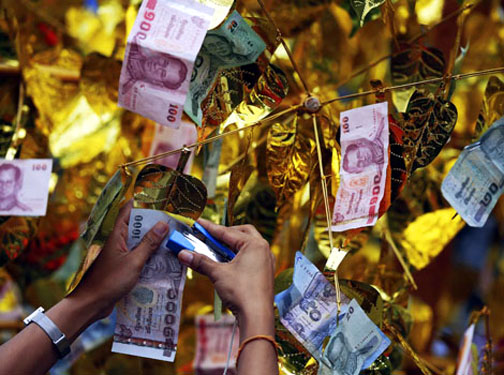
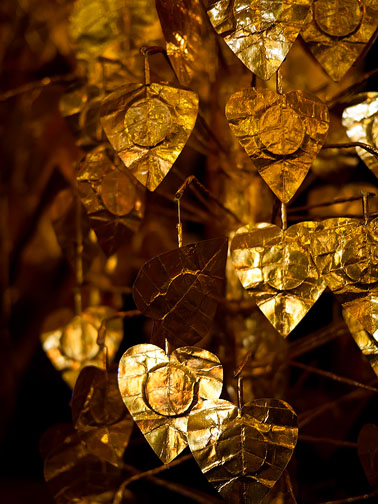
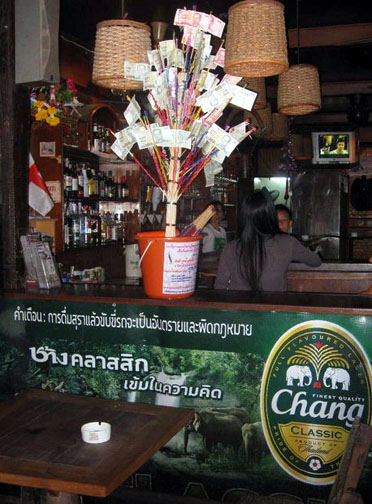

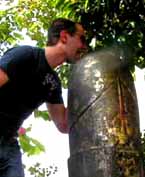
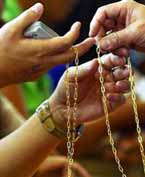
Do the monks wear tidy whities (or, in their case, tidy orangies) under their robes, or do they move around “air conditioned?”
And, suppose for a moment , during a world-wide benefit concert, for indigent and threadbare Thai monks, organized by rocker Bono, both Cher and Lady GaGa donated tons of their old, flamboyant concert tour costumes, all dyed orange, and placed neatly in the woods where the monks are known to visit, would there be any takers for such apparel? 😉
lol
Ya know, I could see Bono doing that!
But a few years ago some head abbot issued a decree about how monks were supposed to not act so gay. So maybe Elton John’s old costumes would be a bigger draw.
RE: Photo #2, Alms, huh? Am I the only one who thought It was a BKK 7-Eleven countertop merchandiser for a line of premium condoms, in heart-shaped golden foil wrappers?
You’re such a romantic Robert!
🙂